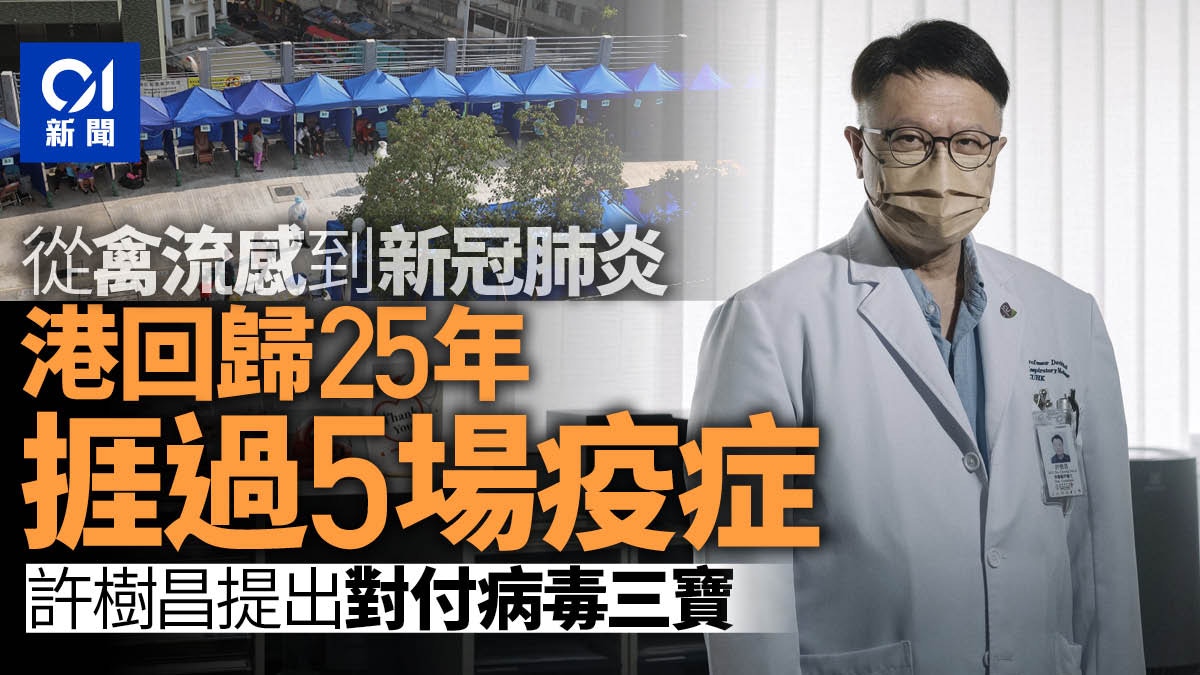In the 25 years since Hong Kong's handover, from the bird flu in 1997 to the new crown epidemic that lasted for more than two and a half years, the fifth wave has claimed more than 9,000 lives.
Taking into account SARS in 2003, swine flu in 2009 and Middle East Respiratory Syndrome in 2015, the public has faced the threat of five major epidemics.
Xu Shuchang, a government expert consultant who has practiced medicine for 37 years and chair professor of the Department of Respiratory System of CUHK, has been at the forefront of the fight against the epidemic many times since his return. He summed up his experience. He admitted that the virus knows no borders, and new viruses will spread as soon as they appear. How to deal with it? be ready?
However, he said, "It will be cooked until the Prophet is buried." Therefore, although Hong Kong has always had a comprehensive medical system and services, he believes that it is still unknown whether it can cope with the next epidemic.
Once it is a powerful new virus, it is even more difficult for the whole world to deal with.
He also proposed to deal with the three treasures of the virus: "The first thing is to know what kind of virus it is, the second is to find a test kit, and the third is to have a good drug treatment."
▼On February 15, the emergency rooms of many hospitals were overwhelmed, and some patients were placed in open spaces▼
+8
Gene sequencing to know bird flu, government orders killing of chickens to stop outbreak
After the handover in 1997, Hong Kong announced the world's first human infection with H5N1 avian influenza virus.
After Hong Kong scientists and many countries conducted genetic sequencing to find the source of the virus, they immediately issued a "chicken killing order", culling a total of 1.3 million live poultry in Hong Kong within three days and cutting off the source of the virus.
Xu Xu Shuchang described the government's decisive actions at that time and successfully prevented the outbreak, and reiterated that it is necessary to know the cause before the epidemic can be controlled.
After the handover in 1997, Hong Kong announced the world's first human infection with H5N1 avian influenza virus.
(File photo/Photo by Lu Yiming)
SARS is like walking in the dark, hospitals lack conditions to deal with
For Xu Shuchang, SARS in 2003 was the most difficult battle.
When SARS first broke out in Hong Kong, it was completely unknown what the virus was.
At that time, there were no negative pressure wards in Hong Kong hospitals, and most of them were large rooms with only curtains to separate the beds.
He pointed out that it was only in 2005 that the government converted ordinary wards into negative pressure wards by renovating the ventilation system.
For Xu Shuchang, SARS in 2003 was the most difficult battle.
(Photo by O Jiale)
Coupled with the lack of effective anti-SARS drugs at that time, only ribavirin, protease inhibitors and steroids were used to treat patients with poor results.
Due to the relatively long treatment time, 14% of patients even suffered from bone dryness due to excessive steroid use.
He bluntly said that at that time, Hong Kong had no conditions to deal with the "strong SARS virus", and the hospital facilities were far from what it is now.
It is understandable that a hotel is closed without a case of swine flu
In 2009, Hong Kong imported an H1N1 swine flu virus, the first confirmed case in Asia.
At that time, the government immediately closed the Wanchai Metropark Hotel where the patient had stayed for 7 days, and all passengers and employees were required to be quarantined.
This move shocked the whole of Hong Kong and was criticized as unbelievable. Later, more business customers sued the government for compensation.
In 2009, Hong Kong imported an H1N1 swine flu virus, the first confirmed case in Asia.
(File photo/Photo by Chen Jiayuan)
Xu Shuchang believes that the government has limited grasp of the new virus, and a case should be handled with more caution.
However, swine flu is a weaker disease. Even if the patient is infected, as long as the disease is diagnosed early, it can be prescribed and treated with Tamiflu.
In addition, vaccine manufacturers are also rapidly developing seasonal influenza vaccines containing influenza A H1N1-like viruses, so there is no fear of repeating the SARS nightmare.
Hard-to-reach infection source MERS ends with zero local cases
The Middle East Respiratory Syndrome broke out in South Korea in 2015. At that time, a Korean national was diagnosed after arriving in Hong Kong. Fortunately, Hong Kong finally defended the whole line of defense and ended with zero local cases.
Xu Shuchang analyzed that because the intermediate host of MERS is camels, patients usually contract the disease through contact with camels, but there is no such animal in Hong Kong, and the routes between the Middle East and Hong Kong are not frequent, and the probability of infection is greatly reduced.
MERS has a mortality rate of 35%, but the immediate transmission rate of the virus is less than 1.
Therefore, since the outbreak of the epidemic in 2012, there have been only about 2,500 cases worldwide.
Omicron outbreak medical system once collapsed
Covid-19 has so far infected more than 1.22 million people and killed more than 9,300.
Xu Shuchang pointed out that the new coronavirus just started to appear as a primitive virus, and its transmission power is not strong.
At that time, it was thought that the medical facilities in Hong Kong were sufficient to deal with the epidemic. However, Omicron, which is highly infectious, was unexpectedly encountered. In the early days of Hong Kong, there were no drugs to reduce the risk of hospitalization and death, which caused the medical system to collapse for a time.
▼On March 9, Queen Elizabeth Hospital transferred non-COVID-19 patients in the hospital▼
+6
However, he bluntly said, "It's easy to say when you turn your head around. In fact, the virus has not yet reached the entrance, so it's really hard to predict how much it will be done at the same time." Over 1,000 copies.
In proportion to the population, no city will have more negative-pressure beds than Hong Kong, but with the fifth wave, hospital beds are still far from enough.
He admitted that the virus knows no borders, and that new viruses will spread as soon as they appear.
As for whether it is enough to cope with the next epidemic, Xu Shuchang also said that it is difficult to make a conclusion, and it depends on what kind of epidemic it is.
He pointed to the three treasures of dealing with viruses: "The first thing is to know what kind of virus it is, the second is to find a test kit, and the third is to have a good drug treatment."
▼Interview with Xu Shuchang▼
+3
Epidemic | Xu Shuchang expects a rebound after Father's Day: the medical system has suffered from bad things and the number of confirmed cases has risen to more than 600 Xu Shuchang: There are protective barriers in the community with few severe cases and deaths The two have nothing to do with Xu Shuchang expects that the confirmed cases will remain in low three digits. The new variant BA.2.12.1 has a 25% higher spread













